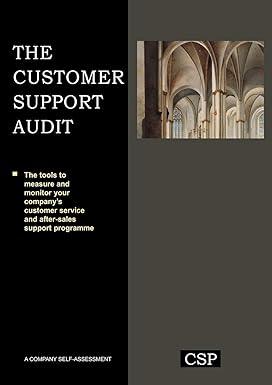Question
1. Which of the following statements is correct? An indirect cost can be readily traced to a cost object while a direct cost is traced
1. Which of the following statements is correct?
An indirect cost can be readily traced to a cost object while a direct cost is traced only to manufacturing costs.
A direct cost can be traced to a specific cost object, while an indirect cost cannot.
A direct cost can be readily traced to a cost object while an indirect cost is traced only to manufacturing costs.
An indirect cost can be traced to a specific cost object, while a direct cost cannot.
2. Which of the following is an example of a variable cost for a manufacturing firm?
The cost of depreciation on equipment.
The cost of raw materials.
The cost of factory supervision.
The cost of rent on the factory.
3. An irrelevant cost:
must differ between decision alternatives.
will not influence a decision.
is also called a differential cost.
must be incurred in the future rather than in the past.
4. Product costs are reported:
on the income statement before goods are sold, and on the balance sheet after goods are sold.
only on the balance sheet.
on the balance sheet before goods are sold, and on the income statement after goods are sold.
only on the income statement.
5. Which of the following is an indirect cost of manufacturing a table made of wood and glass for a firm that manufactures furniture?
The cost of the glass in the table.
The cost of rent on the factory where the table is manufactured.
The cost of the wood in the table.
The cost of the labor used to assemble the table.
6. Which of the following is not a characteristic of managerial accounting?
Reports are prepared as needed.
Information is used by external parties.
Information is subjective, relevant, future-oriented.
Information is reported at the decision making level.
7. Variable costs are:
costs that remain constant no matter the activity level.
costs that are not worth the effort to trace to a specific cost object.
costs that change, in total, in direct proportion to changes in activity levels.
always irrelevant.
8. Which of the following functions of management involves setting short and long-term objectives and the tactics to achieve them?
Reviewing
Planning
Control
Implementing
9. Which of the following costs is not relevant to the decision whether to replace an old computer with a new one?
The cost of the old computer.
The cost to repair the old computer if a new computer is not purchased.
The cost of the new computer.
The cost of a service plan on the new computer.
10. Which of the following is a characteristic of a manufacturing environment that would use job order costing?
Continuous manufacturing
Differentiated products
Standardized production process
Homogenous products
11. A predetermined overhead rate is calculated by dividing:
estimated manufacturing overhead cost by actual total cost driver.
estimated total cost driver by estimated manufacturing overhead cost.
estimated manufacturing overhead cost by estimated total cost driver.
actual manufacturing overhead cost by estimated total cost driver.
12. When disposed of, underapplied manufacturing overhead will:
decrease Finished Goods.
increase Cost of Goods Sold.
increase Finished Goods.
decrease Cost of Goods Sold.
13. When disposed of, overapplied manufacturing overhead will:
increase Cost of Goods Sold.
decrease Finished Goods.
decrease Cost of Goods Sold.
increase Finished Goods.
14. Which of the following types of firms would most likely use job order costing?
C-5 Cement Company
SoooSweet Beverage
Happy-Oh Cereal Company
Huey, Lewey & Dewie, Attorneys
15. Which of the following represents the cost of the jobs sold during the period?
Finished Goods Inventory
Raw Materials Inventory
Cost of Goods Sold
Work in Process Inventory
16. Manufacturing overhead was estimated to be $302,400 for the year along with 21,600 direct labor hours. Actual manufacturing overhead was $232,200, actual labor hours were 22,300. The amount of manufacturing overhead applied to production would be:
$302,400
$239,725
$232,200
$312,200
17. An activity that is performed for a specific customer is a(n):
unit-level activity.
batch-level activity.
facility-level activity.
product-level activity.
18. Which of the following is not true of activity cost drivers?
They are used in Stage 2 cost allocations.
They are strictly volume-based allocation measures.
They ideally have a cause and effect relationship with underlying activities.
They are measures of the underlying activity that occurs in each activity cost pool.
19. Using non-volume-based activity drivers allows activity-based costing to:
assign more indirect costs to products whose production volume is higher.
assign more direct costs to products whose complexity is higher.
assign more indirect costs to products whose complexity is higher.
assign more direct costs to products whose production volume is higher.
20. Using the activity-proportion method results in:
higher cost allocations than the activity rate method.
the same cost allocations as the activity rate method.
higher or lower cost allocations than the activity rate method, depending on the circumstances.
lower cost allocations than the activity rate method.
21. Jackson, Inc. produces two different products (Product 5 and Product Z) using two different activities: Machining, which uses machine hours as an activity driver, and Inspection, which uses number of batches as an activity driver. The cost of Machining is $264,000, while the cost of Inspection is $41,870. Product 5 uses 29% of total machine hours and 40% of total batches. What is the total Machining cost assigned to Product 5?
$187,440
$12,142
$29,728
$76,560
Step by Step Solution
There are 3 Steps involved in it
Step: 1

Get Instant Access to Expert-Tailored Solutions
See step-by-step solutions with expert insights and AI powered tools for academic success
Step: 2

Step: 3

Ace Your Homework with AI
Get the answers you need in no time with our AI-driven, step-by-step assistance
Get Started


